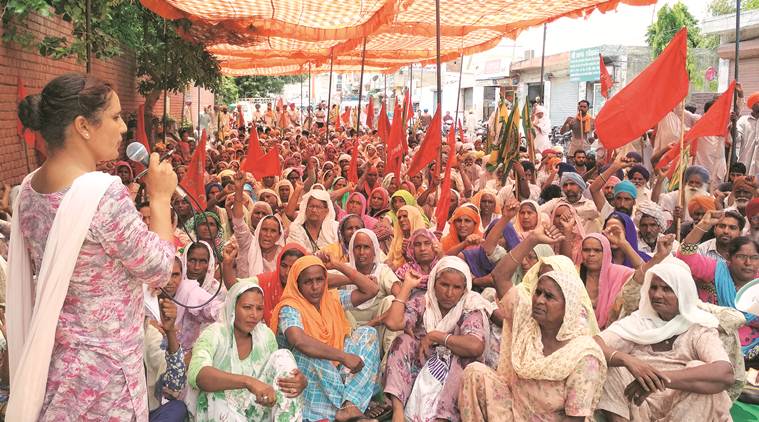As per the Punjab government’s records, a total of 1.57 lakh acres of shamlat land are available for cultivation purposes in the state, out of which a third — just under 53,000 acres — is given on annual lease to Dalits.
ON JUNE 8, 225 members of the gram sabha of Tolewal in Sangrur district’s Malerkotla tehsil passed a resolution to lease out 25 bigha (about 5.25 acres) of the village’s panchayat land reserved for cultivation by Dalits at a nominal annual rate of Rs 500/acre for 33 years. The 225 members were more than the minimum 20 per cent — working out to 180 out of Tolewal’s 870 gram sabha votes — required for passing a resolution. The resolution was, however, not accepted by the panchayat department, which is the custodian of shamlat or village common lands in Punjab. The block development and panchayat officer (BDPO) of Malerkotla-1 has since then sought to organise auction of the 25 bigha (out of Tolewal’s total 165 bigha of shamlat land) six times. Each of these has had to be postponed, due to protests from the village’s Dalits, who also account for 250 or so of its voters.
A similar resolution was passed by the gram sabha of Thandiwal on June 19 and of Mulowal on July 1. The two villages, also in Sangrur, have 19 bigha and 8 bigha of shamlat land, respectively, reserved for allotment to the Dalit community through annual auctions. In their case, too, the authorities have not been able to carry out auctions, even though the sowing/transplanting time for most kharif crops is almost over. In Thandiwal, five Dalits were even booked on charges of attempting forcible farming on land not formally auctioned by the panchayat department.
As per the Punjab government’s records, a total of 1.57 lakh acres of shamlat land are available for cultivation purposes in the state, out of which a third — just under 53,000 acres — is given on annual lease to Dalits. This land, while reserved, is also auctioned and that is normally done from April-end after the harvesting of wheat. This year, on account of the Lok Sabha elections and the Code of Conduct that was in place, auctions could commence only from June 1, well after the poll results were declared. “We are still to auction a fifth of the shamlat lands across the state,” admits Jaskiran Singh, director of rural development and panchayats in Punjab.
The last couple of years have seen spirited protests by groups of landless Dalits, against auctioning of shamlat lands and the “high” reserve prices fixed by the government in these. They also allege that on many occasions, upper caste landowners have fielded “dummy” Dalits to bid on their behalf. The resolutions passed by the three gram sabhas have put the authorities in a fix. “The Punjab Village Common Lands Rules, 1964 does not allow land to be given on lease for more than seven years. Even that can be done only under special circumstances. How can we agree to 33-year fixed leases?,” asks Anurag Verma, financial commissioner and administrative secretary of the rural development and panchayats department.
Beant Singh, sarpanch of Tolewal village, says that the gram panchayat has already sent its resolution to the BDPO at Malerkotla. “We have asked them to either accept or cancel the resolution. They are not cancelling it officially and, at the same time, insisting on auctioning the land that rightfully should be ours,” he adds. The Rs 500/acre annual rate for 33 years that the Dalit groups are offering to pay is way below the government’s reserve price for shamlat lands. These range from Rs 15,000 to Rs 25,000 per acre depending upon location. In Tolewal, Thandiwal and Mulowal, they are closer to Rs 20,000 per acre.
“If land is being reserved for Dalits, it should be given at a reasonable rate. How can we afford to pay Rs 20,000-plus per acre every year? And why should the government behave like a private zamindar and make money from village common lands?,” points out Gurdeep Singh, a landless villager from Thandiwal.
Narbhinder Singh Grewal, the district development and panchayat officer of Sangrur, claims that Dalits are themselves divided over the 33-year lease resolutions. On July 3, when the BDPO last tried to hold an auction, there was even a clash involving two groups of Dalits at Tolewal. “If the problem persists, we will not do any more auctions and, instead, undertake tree plantations on these lands under the Punjab government’s Mission Tandrust,” he warns.
Mukesh Malaud, president of the Zamin Prapati Sangharsh Committee (ZPSC), an organisation championing joint farming by Dalits on panchayat lands, rubbishes Grewal’s charges. “Now that our movement is building momentum and Dalits are becoming aware of their rights, the landed interests are attempting to divide us. The clash that took place in Tolewal was the result of their bribing two Dalits, who were earlier part of our movement. The police, too, initially, booked 11 of our members, including women, charging them of creating law and order problems. Later on, after we lodged complaints, the local Congress leader Lal Singh Chaudhary was arrested under the Scheduled Castes and Scheduled Tribes (Prevention of Atrocities) Act. But he has managed to obtain bail,” he states.
Dalit organisations led by ZPSC have, in the past weeks, been holding protest meetings in villages and also burning effigies of the state government. They are planning a rally at the BDPO’s office at Malerkotla on July 12, when the next auction of the reserved shamlat land at Tolewal village is scheduled.
https://indianexpress.com/article/india/village-commons-landless-dalits-of-punjab-seek-unfettered-rights-of-cultivation-5824533/

No comments:
Post a Comment